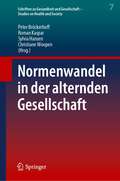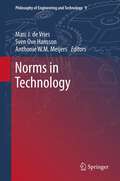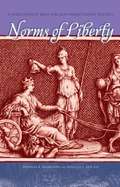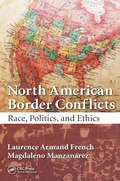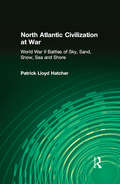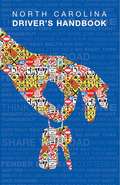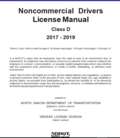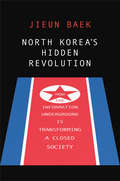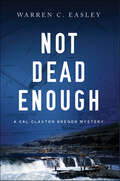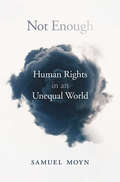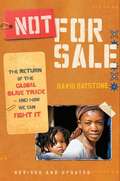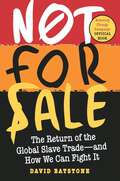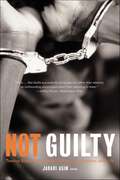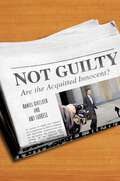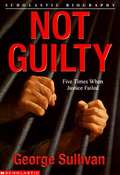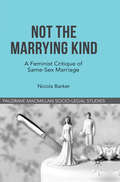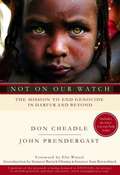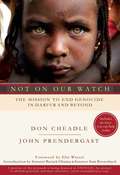- Table View
- List View
Normenwandel in der alternden Gesellschaft (Schriften zu Gesundheit und Gesellschaft - Studies on Health and Society #7)
by Peter Bröckerhoff Roman Kaspar Sylvia Hansen Christiane WoopenUnsere Gesellschaft wird nicht zuletzt dank anhaltendem Wohlstand und medizinisch-technischem Fortschritt immer älter. In den letzten hundert Jahren ist die durchschnittliche Lebenserwartung um mehr als 30 Jahre gestiegen. In einer Gesellschaft des immer längeren Lebens verändern sich Vorstellungen von Gesundheit und Krankheit, Solidarität und Gerechtigkeit. Dieser Sammelband betrachtet aktuelle Fragestellungen hierzu: Wie können wir die Gesundheit der Menschen fördern und bis ins hohe Alter hinein bewahren? Wie können Freiheit und Selbstbestimmung des Einzelnen gewahrt werden? Welche Werte sollen die Gestaltung des Gesundheitswesens leiten? Und wie kann es gelingen, für alle eine gute Pflege im Alter sicherzustellen? Im Rahmen des vorliegenden Tagungsbandes gehen Expertinnen und Experten aus Wissenschaft und Praxis diesen Fragen nach und präsentieren Debatten, Erfahrungen und Erkenntnisse zur Thematik des längeren Lebens in einer alternden Gesellschaft.
Norms in Technology
by Sven Ove Hansson Anthonie W.M. Meijers Marc J VriesThis book is a distinctive fusion of philosophy and technology, delineating the normative landscape that informs today's technologies and tomorrow's inventions. The authors examine what we deem to be the internal norms that govern our ever-expanding technical universe. Recognizing that developments in technology and engineering literally create our human future, transforming existing knowledge into tomorrow's tools and infrastructure, they chart the normative criteria we use to evaluate novel technological artifacts: how, for example, do we judge a 'good' from a 'bad' expert system or nuclear power plant? As well as these 'functional' norms, and the norms that guide technological knowledge and reasoning, the book examines commonly agreed benchmarks in safety and risk reduction, which play a pivotal role in engineering practice. Informed by the core insight that, in technology and engineering, factual knowledge relating, for example, to the properties of materials or the load-bearing characteristics of differing construction designs is not enough, this analysis follows the often unseen foundations upon which technologies rest--the norms that guide the creative forces shaping the technical landscape to come. The book, a comprehensive survey of these emerging topics in the philosophy of technology, clarifies the role these norms (epistemological, functional, and risk-assessing) play in technological innovation, and the consequences they have for our understanding of technological knowledge.
Norms of Liberty: A Perfectionist Basis for Non-perfectionist Politics
by Douglas B. Rasmussen Douglas J. Den UylHow can we establish a political/legal order that in principle does not require the human flourishing of any person or group to be given structured preference over that of any other? Addressing this question as the central problem of political philosophy, Norms of Liberty offers a new conceptual foundation for political liberalism that takes protecting liberty, understood in terms of individual negative rights, as the primary aim of the political/legal order. Rasmussen and Den Uyl argue for construing individual rights as metanormative principles, directly tied to politics, that are used to establish the political/legal conditions under which full moral conduct can take place. These they distinguish from normative principles, used to provide guidance for moral conduct within the ambit of normative ethics. This crucial distinction allows them to develop liberalism as a metanormative theory, not a guide for moral conduct. The moral universe need not be minimized or morality grounded in sentiment or contracts to support liberalism, they show. Rather, liberalism can be supported, and many of its internal tensions avoided, with an ethical framework of Aristotelian inspiration-one that understands human flourishing to be an objective, inclusive, individualized, agent-relative, social, and self-directed activity.
North American Border Conflicts: Race, Politics, and Ethics
by Laurence Armand French Magdaleno ManzanarezNorth American Border Conflicts: Race, Politics, and Ethics adds to the current discussion on class, race, ethnic, and sectarian divides, not only within the United States but throughout the Americas in general. The book explores the phenomenon of border challenges throughout the world, particularly the current increase in population migration in the America, Europe, Asia, the Middle East, and Africa, which has been linked to human trafficking and many other causes of human suffering. North American Border Conflicts takes students through the rich, sad history of border conflict on this continent.
North Atlantic Civilization at War: World War II Battles of Sky, Sand, Snow, Sea and Shore
by Patrick Lloyd HatcherThis book recounts the World War II journeys of a soldier, a ship, and a bottle of spirits through, and around, five great turning-point battles. Those battles were influenced more by geography and climate than by generals and admirals. Properly titled they would be known as the Battles of the Sky (Britain), the Sand (El Alemein), the Snow (Stalingrad), the Sea (North Atlantic), and the Shore (Normandy). Slogging their way through this quintet are an eighteen-year-old G.I. from Missouri (as seen through his letters home), an "ugly duckling" of a Liberty ship (as seen through its Armed Guard reports), and a bottle of rum (as traced by those who, after the war, made money in selling war souvenirs). It is the history of the North Atlantic sea basin and its extensions at war: the story of the lulls between battles, when America's teenage warriors often watched war movies (Humphrey Bogart made and Warner Brothers released seven during the war), sang or listened to popular tunes by songsmiths like Irving Berlin, and drank rum-and-Coke (while listening to Dick Haymes sing the hit "Rum & Coca-Cola"). While accessible and vastly entertaining, this is a serious work of history. By treating World War II in Europe much as Fernand Braudel treated the origins of Western civilization in his masterpiece The Mediterranean and the Mediterranean World in the Age of Philip II, Hatcher brings Braudelian detachment to his narrative.
North Carolina Driver's Handbook
by North Carolina Department of Transportation Division of Motor VehiclesThis handbook was written to help prepare you for the driver license examination. It offers valuable safe driving techniques which will help keep you out of harm's way. If you need additional assistance, contact your nearest driver license office or go online to: www.ncdot.gov/dmv
North Dakota Noncommercial Drivers License Manual: Class D 2017-2019
by North Dakota Department of Transportation Drivers License DivisionThe manual is designed as a basic reference for all drivers, and should be used to prepare for the written driver’s examination. It does not include some of the information needed to qualify for driving passenger buses, school buses, motorcycles, and heavy trucks. Such additional in- formation is contained in separate manuals available at all driver license offices.
North Korea, International Law and the Dual Crises: Narrative and Constructive Engagement
by Morse TanThe Democratic People's Republic of Korea (DPRK) has a reputation as one of the worst human rights situations in the world. This book utilizes a unique international law perspective to examine the actions and inactions of North Korea with regard to international security and human rights. Adopting political, military, historical and legal perspectives, the book explores how the two issues of nuclear weapons and the human rights abuses in North Korea are interconnected, and why the international community should apply the same international law framework to find a solution for both. Drawing on eyewitness accounts, such as refugee and defector testimony, Morse Tan offers a real-life story of North Korea that covers the pertinent law, and constructive approaches of its regime. Tan examines the specific objectives and actions of the North Korean government, and measures these according to international legal obligations such as applicable treaty law, jus cogens norms, and customary international law. The book concludes by offering solutions for dealing with international security surrounding the Korean Peninsula, and forwards a proposal for the creation of a tribunal to prosecute those at the top of the regime for international crimes and human rights abuses. As a project exploring the extremes of international law violation, this book will be of great interest and use to readers interested in the history, and political and legal implications of the strategies employed by the North Korea government.
North Korean Conundrum, The: Human Rights and Nuclear Security
by Robert R. King and Gi-Wook ShinNorth Korea is consistently identified as one of the world's worst human rights abusers. However, the issue of human rights in North Korea is a complex one, intertwined with issues like life in the North Korean police state, inter-Korean relations, denuclearization, access to information in the North, and international cooperation, to name a few. There are likewise multiple actors involved, including the two Korean governments, the United States, the United Nations, South Korea NGOs, and global human rights organizations. While North Korea's nuclear weapons and the security threat it poses have occupied the center stage and eclipsed other issues in recent years, human rights remain important to U.S. policy. The contributors to The North Korean Conundrum explore how dealing with the issue of human rights is shaped and affected by the political issues with which it is so entwined. Sections discuss the role of the United Nations; how North Koreans' limited access to information is part of the problem, and how this is changing; the relationship between human rights and denuclearization; and North Korean human rights in comparative perspective.
North Korea's Hidden Revolution: How the Information Underground Is Transforming a Closed Society
by Jieun Baek&“A crisp, dramatic examination of how technology and human ingenuity are undermining North Korea&’s secretive dictatorship.&”—Kirkus Reviews One of the least understood countries in the world, North Korea has long been known for its repressive regime. Yet it is far from being an impenetrable black box. Media flows covertly into the country, and fault lines are appearing in the government&’s sealed informational borders. Drawing on deeply personal interviews with North Korean defectors from all walks of life, ranging from propaganda artists to diplomats, Jieun Baek tells the story of North Korea&’s information underground—the network of citizens who take extraordinary risks by circulating illicit content such as foreign films, television shows, soap operas, books, and encyclopedias. By fostering an awareness of life outside North Korea and enhancing cultural knowledge, the materials these citizens disseminate are affecting the social and political consciousness of a people, as well as their everyday lives. &“A fine primer on the country, based on extensive interviews with defectors.&”—Times Literary Supplement &“A fascinating book.&”—The New York Times &“[A] timely and cogent book.&”—Los Angeles Review of Books &“A fascinating and intelligent overview of the ways that information is liberating North Koreans&’ minds.&”—Robert S. Boynton, author of The Invitation-Only Zone: The True Story of North Korea's Abduction Project &“A fascinating, important, and vivid account of how unofficial information is increasingly seeping into the North and chipping away at the regime&’s myths—and hence its control of North Korean society.&”—Sue Mi Terry, former CIA analyst and senior research scholar at the Weatherhead East Asia Institute, Columbia University
Not a Day Care: The Devastating Consequences of Abandoning Truth
by Everett Piper"You must read this book. Everett Piper is a man of courage and conviction. He stands nearly alone as an academic leader confronting the ideological fascism of the snowflake rebellion. His call for intellectual freedom must be heard."—GLENN BECK <P><P>What has happened to the American spirit? We've gone from "Give me liberty, or give me death!" to "Take care of me, please." Our colleges were once bastions of free speech; now they're bastions of speech codes. Our culture once rewarded independence; now it rewards victimhood. Parents once taught their kids how to fend for themselves; now, any parent who tries may get a visit from the police. <P><P>In Not a Day Care, Dr. Everett Piper, president of Oklahoma Wesleyan University and author of the viral essay, "This Is Not a Day Care. It's a University!," takes a hard look at what's happening around the country--including the demand for "safe spaces" and trigger warnings at universities like Yale, Brandeis, and Oberlin--and digs in his heels against the sad and dangerous infantilization of the American spirit.
Not Dead Enough: A Cal Claxton Oregon Mystery (Cal Claxton Mysteries #4)
by Warren C Easley"Masterfully crafted... stunningly beautiful descriptions..." —Anne Hillerman, New York Times bestselling authorThe first closing of the floodgates of the mammoth Dalles Dam on the Columbia River inundated the sacred falls and the Native American village at Celilo which depended on the river's magnificent fish. Nelson Queah, Wasco Indian, war hero, and passionate opponent of the dam, watched helplessly as 10,000 years of tribal history and fishing tradition disappeared. That 1957 night, Nelson Queah vanished without a trace.Fifty years later, attorney Cal Claxton, new to Portland after a career as a prosecutor in Los Angeles, attends a commemoration of the flooding of the falls at the behest of his friend, Philip Lone Deer, who introduces Cal to his cousin, Winona Cloud. Winona is Nelson Queah's granddaughter. Spurning the story of a witness at the time who claimed to have seen Queah drunk by the river, she reveals she's found a cache of letters at her grandmother's home, letters Queah wrote to his wife before he vanished. They suggest foul play, and not an accidental drowning.Cal, still grieving over his own wife's suicide, agrees to check out the cold case. He locates the man who put out the drunk story and sets up an interview. When he arrives, he finds the man shot by a sniper. Cal gets a glimpse of the shooter and becomes a target himself.
Not Enough: Human Rights in an Unequal World
by Samuel MoynThe age of human rights has been kindest to the rich. Even as state violations of political rights garnered unprecedented attention due to human rights campaigns, a commitment to material equality disappeared. In its place, market fundamentalism has emerged as the dominant force in national and global economies. In this provocative book, Samuel Moyn analyzes how and why we chose to make human rights our highest ideals while simultaneously neglecting the demands of a broader social and economic justice. In a pioneering history of rights stretching back to the Bible, Not Enough charts how twentieth-century welfare states, concerned about both abject poverty and soaring wealth, resolved to fulfill their citizens’ most basic needs without forgetting to contain how much the rich could tower over the rest. In the wake of two world wars and the collapse of empires, new states tried to take welfare beyond its original European and American homelands and went so far as to challenge inequality on a global scale. But their plans were foiled as a neoliberal faith in markets triumphed instead. Moyn places the career of the human rights movement in relation to this disturbing shift from the egalitarian politics of yesterday to the neoliberal globalization of today. Exploring why the rise of human rights has occurred alongside enduring and exploding inequality, and why activists came to seek remedies for indigence without challenging wealth, Not Enough calls for more ambitious ideals and movements to achieve a humane and equitable world.
Not Fit for Our Society: Nativism and Immigration
by Peter SchragSchrag provides essential background for understanding the fractious debate over immigration. Covering the earliest days of the Republic to current events, Schrag sets the modern immigration controversy within the context of three centuries of debate over the same questions about who exactly is fit for citizenship.
Not-for-Profit Law
by Matthew Harding Ann O'Connell Miranda Stewart Matthew Harding Ann O'ConnellThe law and policy applicable to the not-for-profit sector is of growing importance around the world. In this book, legal experts address fundamental questions about not-for-profit law from a range of theoretical and comparative perspectives. The essays provide scholarly analysis of not-for-profit law, organised around four themes: (1) Politics, in the broader sense of living as a community, and the narrower sense of political power; (2) Charity, how it is defined and changes in its meaning over time; (3) Taxation, including the rationale for government support of the sector through the tax system; (4) Regulation, which is of increasing significance as governments establish increasingly complex forms of regulation of not-for-profit activity. The fundamental aim of the book is to deepen our understanding of not-for-profit law and of the rationales and modes of government support for the not-for-profit sector.
Not for Sale
by David BatstoneHuman trafficking generates $32 billion annually and enslaves over 30 million people, half of them children. Award-winning journalist David Batstone, whom Bono calls "a heroic character," profiles the new generation of abolitionists who are leading the movement. This groundbreaking global report is now updated with the latest findings, new stories, and statistics that highlight what is being done to end this appalling epidemic--and how you can join the movement.
Not for Sale: The Return of the Global Slave Trade—and How We Can Fight It
by David Batstone“Human trafficking is not an issue of the left or right, blue states or red states, but a great moral tragedy we can unite to stop . . . Not for Sale is a must-read to see how you can join the fight.” —Jim Wallis, author of God's Politics“David Batstone is a heroic character.” —BonoIn the revised and updated version of this harrowing yet deeply inspirational exposé, award-winning journalist David Batstone gives the most up-to-date information available on the $31 billion human trafficking epidemic. With profiles of twenty-first century abolitionists like Thailand’s Kru Nam and Peru’s Lucy Borja, Batstone tells readers what they can do to stop the modern slave trade. Like Kevin Bales’ Disposable People and Ending Slavery, or E. Benjamin Skinner’s A Crime So Monstrous, Batstone’s Not for Sale is an informative and necessary manifesto for universal freedom.
Not from Here, Not from There/No Soy de Aquí ni de Allá: The Autobiography of Nelson Díaz
by Nelson A. DiazRaised in the squalor of a New York tenement until he was 10 years old, Nelson Díaz saw his life change when his family moved to a brand-new high-rise project in West Harlem in the 1950s. That experience, along with lessons learned as the only Latino law student at Temple University, would drive him throughout his life as a lawyer and activist, fighting for the expansion of rights for all Americans. “No soy de aquí ni de allá” is a mantra for Puerto Ricans who feel like foreigners wherever they are and who seek a place for themselves. In his inspiring autobiography, Not from Here, Not from There, Díaz tells the story of his struggles and triumphs as his perspective widened from the New York streets and law school classrooms to the halls of power in Philadelphia and Washington, DC. Whether as a leader in economic development, a pioneer in court reform, or a champion of fair housing, Díaz has never stopped advocating for others. Díaz was happy to be the first Latino to “do something,” but he never wanted to be the last. This story of an outsider who worked his way to the inside offers powerful lessons on finding a place in the world by creating spaces where everyone is welcome.
Not Guilty: Twelve Black Men Speak Out on Law, Justice, and Life
by Jabari AsimPatrick Dorismond, Abner Louima, and Amadou Diallo -- hear what a jury of prominent African Americans has to say about the black man's struggle for justice in AmericaPrompted by the killing of Amadou Diallo and the acquittal of the four New York City police officers who mistook him for an armed criminal, this collection of essays by prominent black male writers offers twelve unique and startling perspectives on what it's like for a black man living in an inherently racist society.Coming from a broad spectrum of economic and social backgrounds, the poets, journalists, lawyers, writers, and academics that make up this jury write forcefully and eloquently about growing up and raising sons, identifying with others and yearning to be set apart, attempting reasonable discourse, and succumbing to unspeakable anger. Together these essays deconstruct the monolithic myths that shroud our nation's black men and offer small rays of hope that on the streets, at school and work, and in the courtroom justice will be served.
Not Guilty: Are the Acquitted Innocent?
by Daniel Givelber Amy FarrellAs scores of death row inmates are exonerated by DNA evidence and innocence commissions are set up across the country, conviction of the innocent has become a well-recognized problem. But our justice system makes both kinds of errors—we acquit the guilty and convict the innocent—and exploring the reasons why people are acquitted can help us to evaluate the efficiency and fairness of our criminal justice system. Not Guilty provides a sustained examination and analysis of the factors that lead juries to find defendants “not guilty,” as well as the connection between those factors and the possibility of factual innocence, examining why some criminal trials result in not guilty verdicts and what those verdicts suggest about the accuracy of our criminal process.
Not Guilty
by George SullivanHistory shows that in the nation's justice system, innocent people were wrongly convicted of a serious crime occasionally. This book presents such historical cases that sadly show that justice is not always served.
Not Just Roommates: Cohabitation after the Sexual Revolution
by Elizabeth H. PleckThe late twentieth century has seen a fantastic expansion of personal, sexual, and domestic liberties in the United States. In Not Just Roommates, Elizabeth H. Pleck explores the rise of cohabitation, and the changing social norms that have allowed cohabitation to become the chosen lifestyle of more than fifteen million Americans. Despite this growing social acceptance, Pleck contends that when it comes to the law, cohabitors have been, and continue to be, treated as second-class citizens, subjected to discriminatory laws, limited privacy, a lack of political representation, and little hope for change. Because cohabitation is not a sexual identity, Pleck argues, cohabitors face the legal discrimination of a population with no group identity, no civil rights movement, no legal defense organizations, and, often, no consciousness of being discriminated against. Through in-depth research in written sources and interviews, Pleck shines a light on the emergence of cohabitation in American culture, its complex history, and its unpleasant realities in the present day.
Not The Marrying Kind: A Feminist Critique of Same-Sex Marriage (Palgrave Socio-Legal Studies)
by N. BarkerNot the Marrying Kind is a new and comprehensive exploration of the contemporary same-sex marriage debates in several jurisdictions including Australia, Canada, South Africa, the United Kingdom and the United States. It departs from much of the existing scholarship on same-sex marriage, which argues either for or against marriage for same-sex couples. Instead, this book begins from a critical analysis of the institution of marriage itself (as well as separate forms of relationship recognition, such as civil partnership, PaCS, domestic partnership) and asks whether and how feminist critiques of marriage might be applied specifically to same-sex marriage. In doing this, the author combines the theories of second wave feminism with insights from contemporary queer theory.
Not on Our Watch: The Mission to End Genocide in Darfur and Beyond
by Don Cheadle John PrendergastIf you care about issues of genocide and other mass atrocities, but you don't know what to do to make a difference, this book was written for you.
Not on Our Watch: The Mission to End Genocide in Darfur and Beyond
by Don Cheadle John PrendergastAn Academy Award-nominated actor and a renowned human rights activist team up to change the tragic course of history in the Sudan--with readers' help.While Don Cheadle was filming Hotel Rwanda, a new crisis had already erupted in Darfur, in nearby Sudan. In September 2004, then-Secretary of State Colin Powell termed the atrocities being committed there "genocide"--and yet two years later things have only gotten worse. 3.5 million Sudanese are going hungry, 2.5 million have been displaced by violence, and 400,000 have died in Darfur to date.Both shocked and energized by this ongoing tragedy, Cheadle teamed up with leading activist John Prendergast to focus the world's attention. Not on Our Watch, their empowering book, offers six strategies readers themselves can implement: Raise Awareness, Raise Funds, Write a Letter, Call for Divestment, Start an Organization, and Lobby the Government. Each of these small actions can make a huge difference in the fate of a nation, and a people--not only in Darfur, but in other crisis zones such as Somalia, Congo, and northern Uganda.
